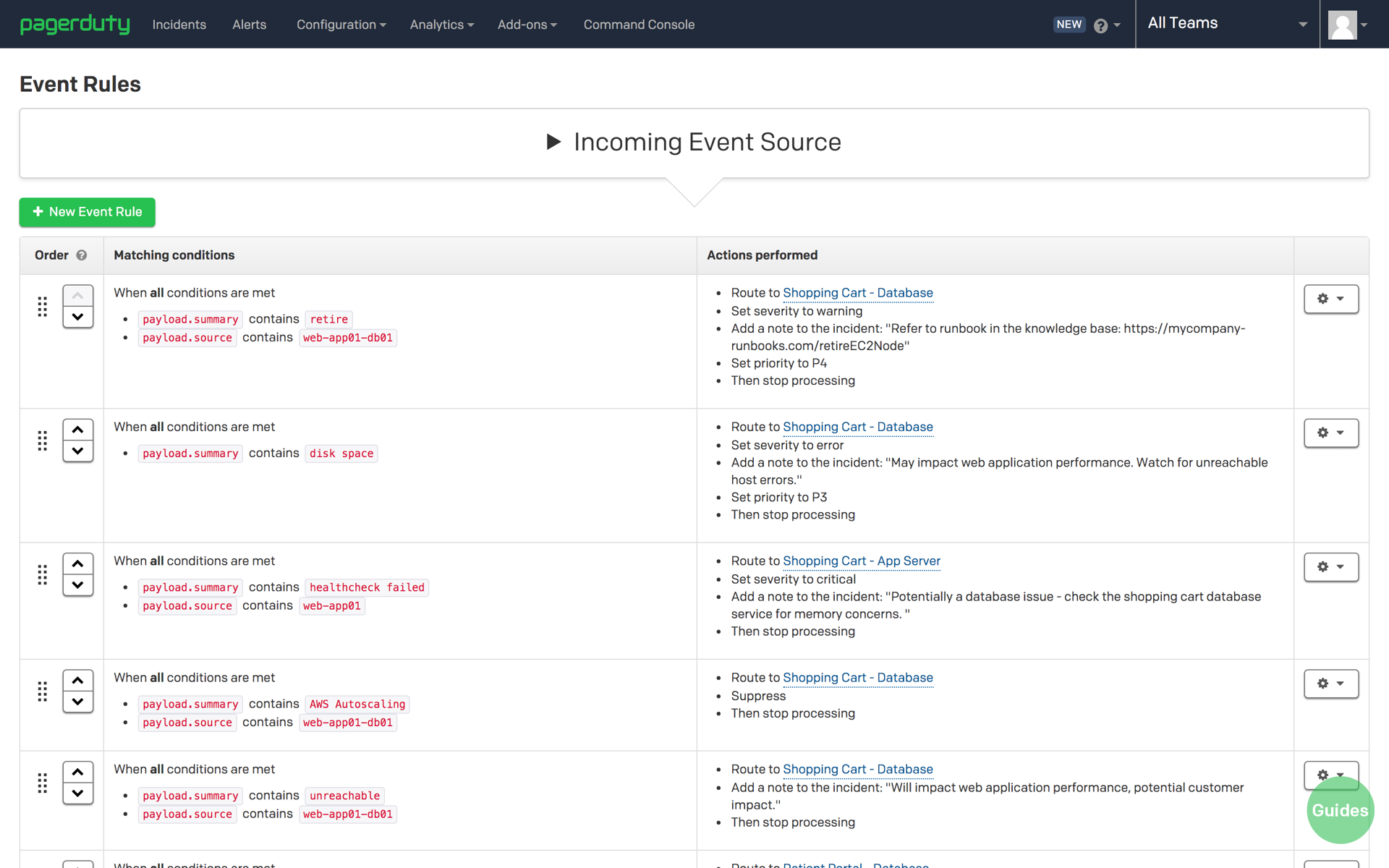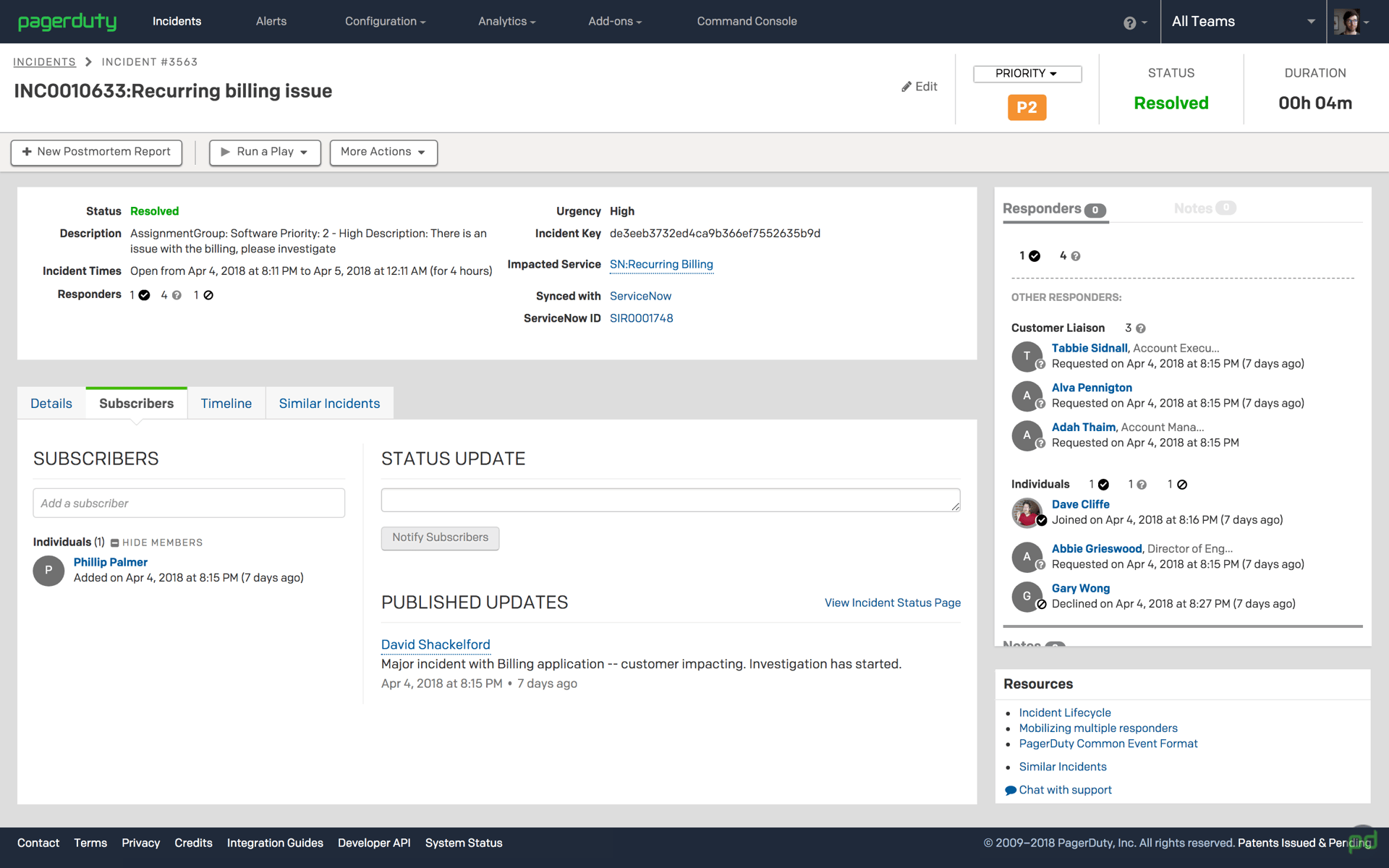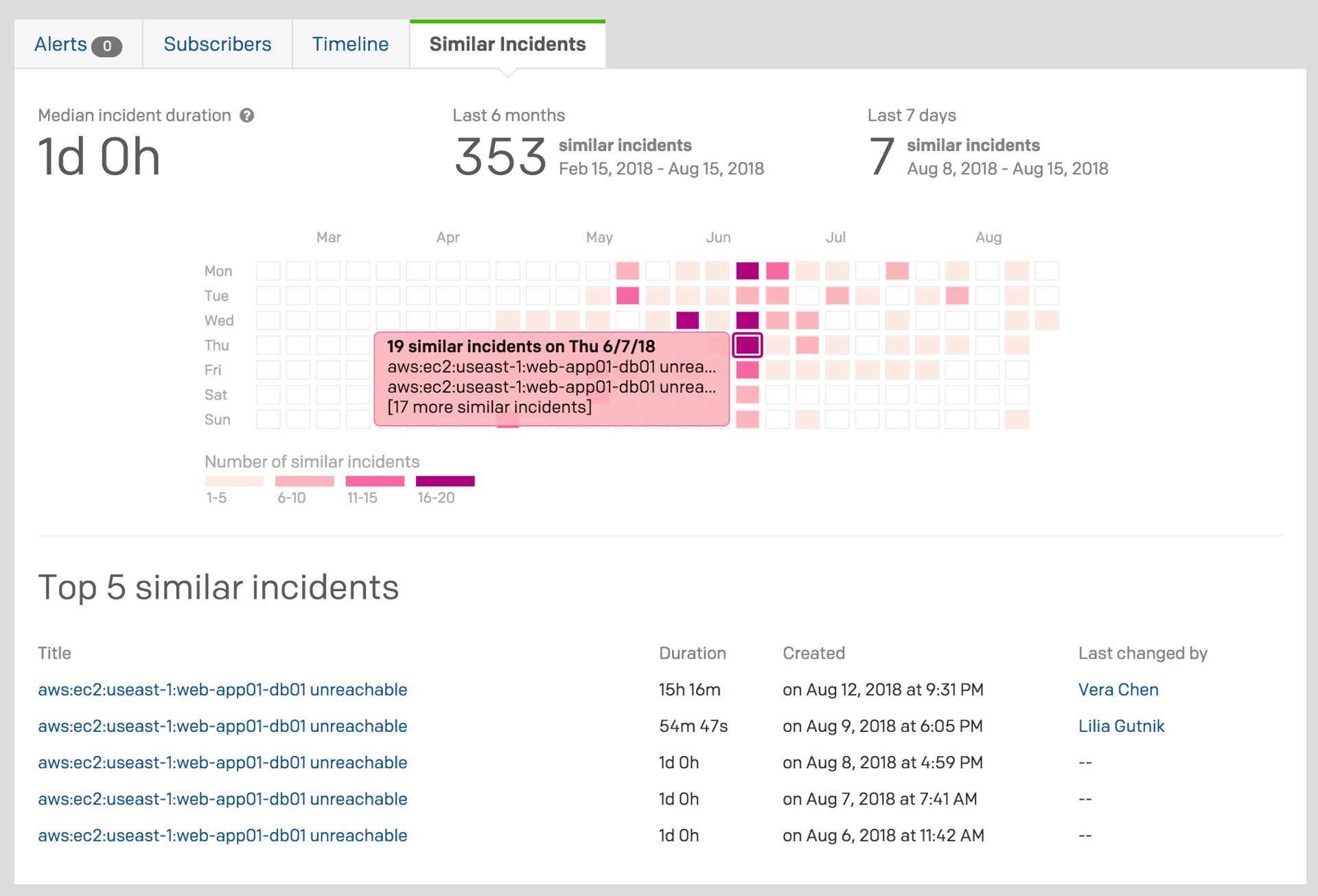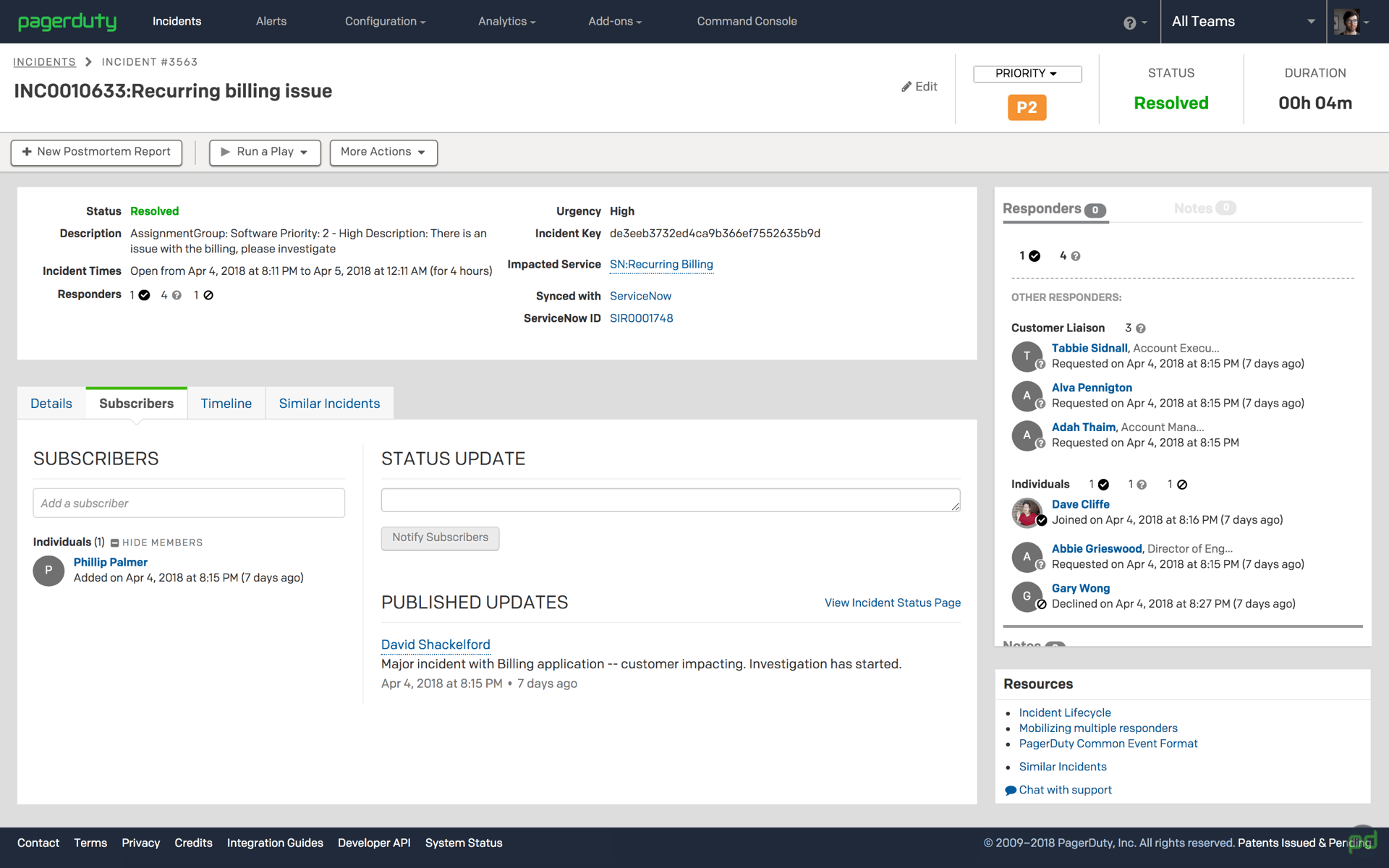What’s New This Summer
2018 has been a momentous year at PagerDuty. We spent the past six months accelerating the development of many new PagerDuty product innovations, and have released a variety of updates and enhancements across our digital operations management platform and mobile applications.
These offerings further enable organizations to optimize response orchestration and continuous development and delivery better than ever before—developers, operations teams, DevOps practitioners, and managers can now visualize every dimension of the customer experience through contextual insights and interactive applications.
Product Releases
Event Intelligence Release
Our newest product offering, Event Intelligence, blends machine and human telemetry, incorporating both digital signals and human response behavior to optimize digital operations. Automatic, adaptive learning algorithms help cut through the noise, making it easier for teams to focus on innovating and being more productive. Integrated event intelligence and incident response ensure that everybody is on the same page and has the context they need to resolve issues faster. Routing and workflow automation, intelligent alert correlation, noise suppression, similar incidents, APIs, and programmability all work together to deliver responders the exact machine and human context they need.
Event Rules, PagerDuty’s routing and workflow automation feature, helps you programmatically manage large volumes of event data from 200+ tools. You can intelligently automate routing, suppression, notification, and other behaviors based on event data, issue severity, support hours, and more.

Intelligent Alert Grouping reduces noise while centralizing critical context to speed triage via applied machine learning and rules-based approaches that automatically group related incoming alerts across complex systems into a single incident.

Similar Incidents help you view past related issues automatically embedded within incidents to improve triage. You can see which experts were involved in handling previous similar issues and how often the issues have occurred in the past, as well as gain contextual insights from past incidents that are enriched with remediation instructions that can help you resolve issues faster.

Ongoing Enhancements
Earlier in the year, we released Modern Incident Response capabilities, and we’re continuing to build upon this offering while also incorporating feedback from our customers.
Updates to Modern Incident Response
You may already be using PagerDuty’s Response Plays to mobilize a multi-team response and subscribe stakeholders to incident updates with a single click. Now you can also tie in a Response Bridge to your response plays so responders can seamlessly collaborate, enabling them to get down to the bottom of issues and restore your business’s critical services faster.

Live Call Routing enhancements. In addition to being able to reach on-call responders immediately by dialing a phone number and having the call routed via on-call schedules and escalation policies associated with your critical apps and services, you can now also:
- Customize the ring duration before a call escalates to the next responder
- Customize the auto attendant greeting
- Transcribe the call
This flexibility accommodates the response processes of different teams and promotes learning across teams and the entire organization.
Incident timeline itemization of all escalations during response mobilization. Knowing who to engage in incident response is critical to accelerating incident response, allowing the right people to focus on solving critical issues so others can return to innovating. PagerDuty’s incident timeline captures a wealth of incident-related activity such as response plays, custom incident actions, chat conversations, and more. Now, all escalation-related activity occurring during response mobilization is also itemized in the incident timeline and can be easily included in the valuable postmortems that your teams rely on when facing recurring or new issues.
Learn more about how you can include critical incident-related activity in your postmortems.
Integrations and API
The PagerDuty development platform delivers flexible APIs and extensibility tools so any team can easily integrate with and extend PagerDuty. We already have you covered with 300+ built-in integrations and extensions—and we keep adding more!
The latest PagerDuty + ServiceNow Certified Integration helps IT teams address any critical service management and security incident issues in real time. Teams are empowered to mitigate threats and accelerate root cause identification and service restoration. With this integration, teams can reduce mean time to resolution and the impact of digital disruptions to the business via:
- Service and team synchronization
- Real-time response across the ServiceNow platform
- Automated enterprise-wide mobilization
- Accelerated security incident response

PagerDuty + Microsoft Azure and Visual Studio Team Services (VSTS) are another couple of integrations we’re excited about as they provide teams with operational health insights and event intelligence throughout the software development lifecycle. Teams are empowered to code, own, and manage applications better with PagerDuty and Microsoft—so they can get ahead of customer-impacting issues and deliver higher-quality applications and services, faster. Additional benefits include:
- Automatic sync of PagerDuty incidents with Microsoft Azure Metric Alerts and Microsoft Visual Studio Team Services Work Items
- Support for new Microsoft Azure metric alert format
- Accelerated incident response and service delivery
- Reduced development cycle times with better context
- Improved visibility across services and Azure infrastructure
https://www.youtube.com/watch?v=JbCz9HW09rk
V2 webhooks. Incident-based webhooks allow you to send outgoing webhook messages to webhook URLs when incidents are triggered. The webhook recipients receive a payload containing a messages array that may contain multiple message elements, including ID, event, creation date/time, incident, webhook, and log entries.
Webhooks on Notes. Get a webhook whenever a note is added to an incident
API for adding extensions to an account. Add extensions (like webhooks) to a service over the API.
Mobile
Update: iOS Support for Universal Links. A harmonious mobile experience is important to responders on-the-go as every second a responder saves can positively impact revenue and customer experiences—which is why we implemented iOS support for universal links. Links to incidents, escalation policies, and users that are tapped on from iOS Safari, Mail, and Messages open seamlessly in the PagerDuty App.
We’ve received a lot of feedback about our mobile apps. People love being able ack and escalate from their mobile devices, no matter where they are—so we decided to make our apps even more convenient by adding the following features:
- iOS 1Password integration.
- Clickable phone numbers and URLs in incident details, notes, and more.
- Incident Priority support, including details, incidents list, sorting, and more.
- Tappable iOS phone numbers and URLS in responder requests and notes in the incident timeline.
- Live updating in the PagerDuty mobile app. Check out our engineering blog for more details.
Those are all our updates so far for 2018! But the year isn’t over yet, and we have a lot more to announce later this year, so stay tuned and check in from time to time to ensure you get the latest and greatest info surrounding our products and features.


